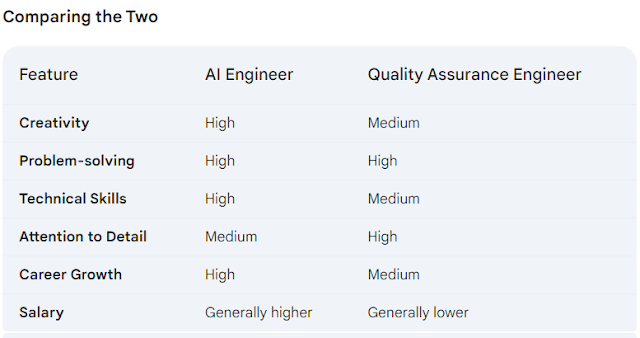Introduction
The choice between being an AI Engineer
and a Quality Assurance (QA) professional depends on your interests, skills,
and career goals. Both roles are crucial in the tech industry but focus on
different aspects of software development. Here are some key points to
consider:
AI Engineer
Responsibilities:
Developing machine learning models and
algorithms.
Working on data analysis and data
preprocessing.
Implementing AI solutions for various
applications (e.g., natural language processing, computer vision).
Researching and staying updated with the
latest advancements in AI and ML.
Collaborating with other developers and
data scientists to integrate AI solutions into products.
Skills Required:
Strong programming skills (Python, R,
etc.).
Knowledge of machine learning frameworks
(TensorFlow, PyTorch, etc.).
Understanding of data structures,
algorithms, and statistics.
Experience with big data technologies and
tools.
Analytical thinking and problem-solving
skills.
Career Prospects:
High demand for AI skills across various
industries (tech, healthcare, finance, etc.).
Opportunities to work on cutting-edge
technology and innovative projects.
Potential for higher salaries due to
specialized skills.
Quality Assurance (QA) Engineer
Responsibilities:
Designing and executing test plans and
test cases.
Identifying and reporting bugs and issues
in software.
Ensuring software meets quality standards
before release.
Automating testing processes using tools
and frameworks.
Collaborating with developers to improve
product quality.
Skills Required:
Knowledge of software testing
methodologies and tools.
Programming skills for test automation
(Java, Python, Selenium, etc.).
Attention to detail and a meticulous
approach to testing.
Strong communication skills for reporting
issues and collaborating with teams.
Understanding of the software development
lifecycle.
Career Prospects:
Consistent demand for QA professionals
across all software development sectors.
Opportunities to specialize in areas like
automation testing, performance testing, or security testing.
Vital role in ensuring the reliability
and functionality of software products.
Comparison
Interest and Passion:
Choose AI Engineering if you are
passionate about data science, machine learning, and developing intelligent
systems.
Choose QA Engineering if you have a keen
eye for detail, enjoy breaking things to make them better, and ensuring
high-quality software.
Learning Curve:
AI Engineering may require a steeper
learning curve due to the complexity of machine learning and AI concepts.
QA Engineering also requires learning but
is more focused on mastering testing methodologies and automation tools.
Career Growth:
Both fields offer strong career growth
opportunities, but AI Engineering is often associated with higher salaries and
rapid advancements in technology.
QA Engineering provides a stable career
path with opportunities to specialize and advance within the QA domain.
Comparison of the Two AI vs QAE
Conclusion
Both careers are rewarding, but your
choice depends on your interests and skills:
Choose AI Engineer if you love working
with data, algorithms, and creating intelligent systems.
Choose QA Engineer if you have a keen eye
for detail, enjoy testing, and ensure software quality.
For more insights and guidance on tech careers, visit PythonSage.
Happy coding!



